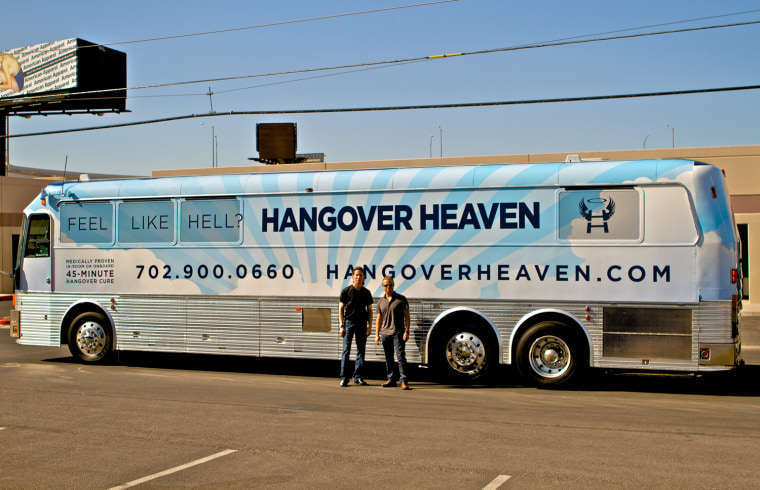OK, now it's official: Everything that happens in Vegas, stays in Vegas -- even your alcohol-infused headache and upchucking tummy.
A mobile, hangover treatment center – a bus adorned with plush sofas, a well-coiffed doctor and special IV bags – is set to roll out Saturday, trolling the Las Vegas strip from 8 a.m. to 4 p.m., vowing to quickly flush last night’s fun overdose from your wilted body.
Hangover Heaven is the brainchild of Dr. Jason Burke, a board-certified anesthesiologist who trained at Duke University and who –- if his venture pops the financial cork -- hopes soon to quit his day job as a hospital anesthetist.

For $90 to as much as $200 (if you also choose his IV vitamin mix), Burke will pick you up, offer a cushy seat, plug an intravenous line into your vein and cleanse that post-party pain with a blend of fluids containing electrolytes and other solutions to cure dehydration, the anti-nausea drug Ondansetron, and the anti-inflammatory drug Ketorolac. The treatment takes about 45 minutes.
Burke’s first-ever patient: himself.
“In the recovery room, I treat people who have nausea, aches and pains, disoriented feelings. I treat that all the time with intravenous anti-nausea medications, anti-inflammatories and IV fluids. And I thought: this would treat a hangover,” said Burke, who earned a medical diploma at the University of North Carolina in 1996, msnbc.com confirmed.
“One day I had a bad hangover. I put in an IV with these medications and I was absolutely amazed at how well it worked.”
Across the medical community, reaction to Burke’s enterprise is some smirks and concern about potential risks.
“We always think of hydration as a way to treat a lot of problems," said Dr. Mark F. Newman, chair of the department of anesthesiology at Duke University Medical Center, who knows Burke. "And obviously, we treat people post-operatively all the time with [anti-nausea] drugs ... and anti-inflammatories. On their own, they’re all safe,”
But Newman cautions, "in the way that Jason’s using (these drugs) in Las Vegas, we don’t have any data that would say, in that environment, it would be safe or efficacious."
Just because a treatment is safe in one environment doesn't mean that it would be in a different one, Newman explains. “You’re in a situation where you’re potentially giving medications that can have side effects. Are you able to respond appropriately?”
Besides, hangovers are nature’s little wrist slap, added Michael Roy, executive director of Clearview Treatment Programs in Los Angeles.
“It’s helpful for people to experience the negative effects of their drinking so they do not repeat excessive drinking episodes,” Roy said.
Then there’s the damage alcohol can do to people with heart problems or other high-risk conditions, said Art Caplan, Ph.D, director the Center for Bioethics at the University of Pennsylvania.
“The hangover bus doc is flying in dangerous territory,” Caplan said via email. “What if he deals with diabetics or epileptics or someone with some other high risk disease? If (that client) croaks, he is losing his license no matter what consent they sign.”
In response, Burke said he won’t treat anyone who is “visibly intoxicated” or anyone who informs him they have “complex medical problems.” He called his anti-hangover medley “mainstays of the anesthetic regimen” used “thousands of times a day all over the world,” thus making the risk of complications “just not that high, especially for a single dose.”
From his ethical vantage point, however, Caplan just doesn’t see how a physician can endorse – even tacitly – vacationers getting tanked.
“I know this is Vegas, but, come on … Docs should not tell you to get blind, stinking drunk and then offer to wash you out,” Caplan said.
More from Vitals:
Out-of-whack sleep habits can cause diabetes